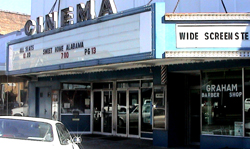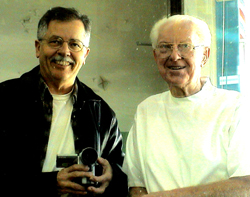|
|
Saturday, February 01, 2003 |
|
I have been having a hard time for the past few days trying to determine what bothered me (the most) about the State of the Union speech that President Bush gave. This morning I was watching (and trying to do) a Yoga class that I had recorded on Tivo yesterday, called Inhale. At the end of the class the instructor Steve Ross was talking about various topics and he briefly spoke about eloquence. After thinking about what Steve said and looking up the definition of eloquence I realized that this is what I was missing from President Bush's State of the Union speech. I might be too picky about President Bush's speaking abilities. I really believe that someone who makes a living as a politician should be able to speak in public with some degree of polish. I believe that someone who has the background and history in politics that President Bush and his family has should have known that he was going to be making very important speeches during the course of his career and he would have learned to speak in public with eloquence. I am sorry to say that I was embarrassed for President Bush while he attempted to make this speech to his Nation. 11:49:39 AM |
|
Where Whuffie came from http://www.well.com/conf/inkwell.vue/
11:38:13 AM |
|
Blogger News Item. End referrer abuse in Radio. How not to spam folks' referrer logs with Radio's aggregator. (168 words) [markpasc.org] [Roger Jones' Manila Weblog] 10:47:16 AM |
|
The architecture of data-rich public spaces.  I looked out the window this morning and was greeted by a six-story-high image of George Bush. I was in Times Square, on the 19th floor of a hotel, facing the brobdingnagian information display that ascends and wraps around the Reuters building. Movies like Blade Runner conditioned us to expect these displays. Minority Report updated the concept with aggressive personalization. But the Reuters display is about something different, and far more interesting, than the advertising techniques imagined in those movies. Its designer, ESI's Edwin Schlossberg (yes, that Edwin Schlossberg), has profound ideas about public information display as a focus for interaction. From Wired 10.12: I looked out the window this morning and was greeted by a six-story-high image of George Bush. I was in Times Square, on the 19th floor of a hotel, facing the brobdingnagian information display that ascends and wraps around the Reuters building. Movies like Blade Runner conditioned us to expect these displays. Minority Report updated the concept with aggressive personalization. But the Reuters display is about something different, and far more interesting, than the advertising techniques imagined in those movies. Its designer, ESI's Edwin Schlossberg (yes, that Edwin Schlossberg), has profound ideas about public information display as a focus for interaction. From Wired 10.12:
Schlossberg's next big thing is the Reuters News Index, an addition to the sign that debuts in 2003. Roughly every hour, a 304-foot thermometer will appear onscreen measuring how "hot" the news day is on a scale of zero to ten. Schlossberg hopes it will inspire people on the street to turn to each other and say, "Did you see that? The News Index just shot up to 6 degrees -- what have you heard?"... [Jon's Radio] 10:44:31 AM |
|
Current snapshot on Open Standards - Status Report #2. OK - so I've been studying and learning of other efforts (xx) that are part of this vision of a world that leverages Open Standards to create a mesh to connect the world together. I posted a first status report yesterday - which planted by Digital ID, my past and current efforts into cyberpsace. Today I bring all that with me, and add in reference points to other efforts, actual proposals and efforts by others and more or less post a Status Report #2.
The Open Content Network was announced, Kazaa sued the RIAA, the Alwayson-network launched and Doc talked about the local Barber shop in his home town (and started to discover the importance of having an integrated media management system and being able to aggregate media from anhywhere on the web - into one place.) And AOL lost $100B in value.
Here's my Topic Channel I created for 'TheMatrix'. Phil Pearson's Internet Topic Exchange is one of the five servers I've identified we need. Perhaps Ryze or Ascio's server can be the open source digital identity solution, compatible with PingID - of course. Unfortunately I can only attach so many topics to this post - as in reality this post really acts as a central anchor point for ricocheting all my poiinters, references, links, posts or discussions on where all these trends, efforts and status - are coming together. So I'd want ALL current links to me and this open standard proposal - to hit THIS permalink, but guess what? I need to update the status - so what do I do? A new kind of link- a link proxy server - that's NOT tied to URLs at all! Maybe we should call it an anchornode. Anway - as I make more status reports - I'll update the main information and status of our efforts, point to the archived/previous status reports and move on. But for now - we're stuck with using the good old fashioned blog microcontent type (with permalinks and embedded <img tags) - which will have to suffice - for now. I also use LiveTopics topics as well, but that ain't standard - by any means - yet. Hopefully Phil and Matt will help change that - soon enough. So there you have it folks - Status Report #2 - chronicling the journey towards 'the mesh'. But first - the Matrix.
A lot of all this was inspired by Doc's Infrastructure Presentation - which caused me to present my own rap at WebBuilder '02 - with thanks to Scoble for pulling that off! And of course none of this would be possible without RSS, XML-RPC, OPML and Dave Winer. Here's my Ryze location and my Technorati status. [Marc's Voice]10:33:41 AM |
|
No future? The Well is well I respect Dave Winer -- and, as the founder of UserLand, which supplies the software this and all Salon Blogs run on, he is a business partner and general godfather of our little corner of the blogosphere. But he wrote something today that I need to offer a different perspective on.
I'm assuming this refers to Maria Wilhelm, who was Well CEO at a time when, yes, the folks who owned the Well had a notion of trying to compete with AOL. That didn't work for a bunch of reasons -- including a very important one, that the Well's users didn't want it to be like AOL. But to say that the Well had "no future" then is demonstrably wrong, unless "future" means "big growth that grabs the attention of Wall Street," which is not what I think Dave means. The Well had the future then that you can find in its present existence -- as a thriving online community with thousands of interesting posts each week. So what if it didn't grow to become AOL-sized? The Well was always a different beast -- a for-pay community when that was unfashionable, a "closed door" space (only members can read most of the conferences) rather than a fully public environment, and an online place where posting under your real name is the norm, and you pretty much always know who you're talking to. These attributes may not be what everyone is looking for as they choose their online homes, but they help make the Well unique. Salon acquired the Well back in 1999 and from where I sit (as a Well member since, I think, 1990) it remains enormously important to us in many ways. Most of the Well remains "behind closed doors" to non-members, but if you're interested in checking it out, you can look at a couple of areas that are open to anyone to read: the "Inkwell.vue" conference, which features interviews with authors (Cory Doctorow's in there now); and the new "Pre.vue," a members-organized conference that offers a taste of the range and depth of the Well's conversations. [Scott Rosenberg's Links & Comment]8:55:11 AM |
|
Put Those Glasses Away for Good. This story is mostly for people above 40 and who need special glasses to see clearly both near and far. The condition is called presbyopia (Greek for "old vision"). It starts at fortysomething and worsens for the next 20 years, as the lenses harden or enlarge and lose the flexibility to focus at close range. One alternative is progressive specs -- with lenses that increase in magnification, so you don't have to take them off. "Past age 40, the eye loses its flexibility." Here is how the eye works with and without correction. The illustration is from BusinessWeek. (Copyright 2003, by The McGraw-Hill Companies Inc.) Instead of having one or two pairs of glasses, you can look at several surgical solutions. Conductive keratoplasty (CK) Surgical reversal of presbyopia (SRP) Refractive lens exchange I don't know about you, but I'll keep my glasses: the idea of a surgeon cutting through my eyes frightens me. If you're interested, please read the whole article. Source: Pam Black, BusinessWeek, January 27, 2003 [Roland Piquepaille's Technology Trends]8:31:58 AM |
|
Science Fiction and Smart Mobs. Henry Jenkins is director of the Program in Comparative Media Studies at the MIT. In this article, he compares the new science fiction comic book from Warren Ellis, Global Frequency and the more serious book from Howard Rheingold, Smart Mobs. Set in the near future, Global Frequency depicts a multiracial, multinational organization of ordinary people who contribute their services on an ad hoc basis. As Ellis explains, "You could be sitting there watching the news and suddenly hear an unusual cell phone tone, and within moments you might see your neighbor leaving the house in a hurry, wearing a jacket or a shirt with the distinctive Global Frequency symbol...or, hell, your girlfriend might answer the phone...and promise to explain later...Anyone could be on the Global Frequency, and you'd never know until they got the call." Ellis's story responds to significant shifts in the media environment -- in particular the increasing role of mobile phones and wireless computing -- but also to speculations about their social and political impact. It is almost as though Ellis was illustrating arguments that Howard Rheingold makes in his new book, Smart Mobs. As Rheingold explains, "Smart mobs consist of people who are able to act in concert even if they don't know each other. The people who make up smart mobs cooperate in ways never before possible because they carry devices that possess both communication and computing capabilities.... Groups of people using these tools will gain new forms of social power." This is important stuff -- a compelling new theory about political power and social affiliation from the man who coined the term "virtual community." Rheingold offers a number of examples, ranging from the "thumb tribes" in Japan whose social life is organized around instant messaging to the antiglobalization movementís alternative news organizations, from the reader-moderation on Slashdot to the use of cell phones to wage revolution in the Philippines. Global Frequency and Smart Mobs hit the stands at almost the same moment and compliment each other perfectly. Both help to bring ideas from top research facilities to lay readers. More information about topics discussed in Howard Rheingold's last book can be found at the Smart Mobs weblog. Source: Henry Jenkins, Technology Review, January 31, 2003 [Roland Piquepaille's Technology Trends]8:24:03 AM |
 This is all going on the same week that
This is all going on the same week that  I meet with folks from the
I meet with folks from the 

